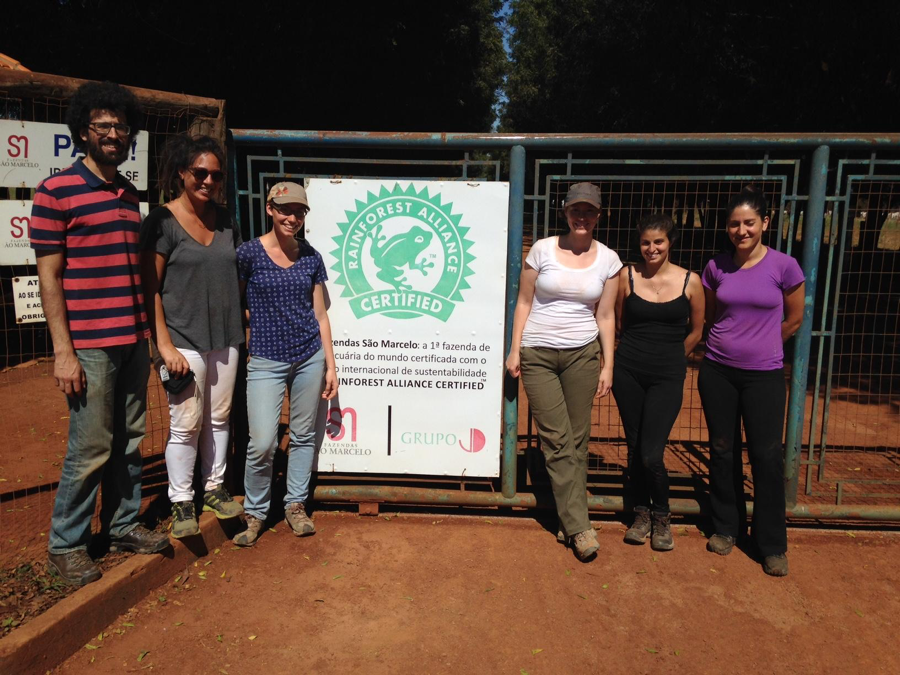
A country of vast natural wealth, a roller-coaster economy and one of the most romanticized cultures on Earth, Brazil has assumed a significant role in the complex arena of global finance and politics. It is home to over 203 million human residents, but they are outnumbered by 205 million cattle, making Brazil’s growing herd the largest of any country. My summer internship gave me an incredible window into the cutting-edge sustainability work being done in Brazil to protect the Amazon and improve cattle farming practices.

I worked as part of an international team supported by the Global Innovation Initiative (GII) that included specialists from the Universities of Michigan, Oxford and Sao Paulo, as well as the nonprofits Imaflora, Rainforest Alliance and Climate Change Agriculture and Food Security. The University of Michigan team, representing the Ross School of Business, the School of Natural Resources and Environment and the Ford School of Public Policy, focused on the potential for avoided deforestation and reduced greenhouse gas emissions in the cattle sector, due to sustainable farming practices. At a broader level, the GII project took lessons learned from sustainable certification in Brazil’s coffee sector to assess implications for certification in the cattle industry.
The Problem
Amazon deforestation is contributing to global climate change. In the last 50 years, more than 17 percent of the Amazon has been deforested, largely in support of the Brazilian cattle industry. Cited as the country’s single largest contributor to greenhouse gas emissions, the industry produces one-third of the beef traded internationally and emits about 1,000 metric tons of CO2 equivalent per year (the equivalent of 20 percent of U.S. automobiles’ yearly CO2 emissions). An additional 57.4 MT CO2eq of methane is released from cows’ digestion process each year.

Pressure is mounting to change the cattle industry in Brazil, notably in the form of Greenpeace’s 2009 landmark report “Slaughtering the Amazon” and from organizations like the Working Group on Sustainable Beef. Despite policy changes, such as the 2009 beef moratorium (mandating that slaughterhouses accept cows only from farms not recently deforested), and guidelines from the Brazilian Enterprise for Agricultural Research (Embrapa), significant traceability and accountability issues remain for farms that deforest.

Certification
Our team started in the city of Piracicaba, near São Paulo, working with the Brazilian nonprofit Imaflora. The organization focuses on certification as a means to drive the sustainable use of natural resources, and it was instrumental in certifying the first cattle farm in Brazil, Fazenda São Marcelo. This full-cycle farm—from birth to finishing—in the state of Mato Grosso strictly adheres to the Rainforest Alliance guidelines, including animal welfare and labor standards, and compliance with environmental regulations.

Intensification
The process of raising more cattle on less land—called intensification—is the primary recommendation for not only reducing deforestation but also benefiting from carbon sequestration. Although intensification requires more inputs—fertilizer, diesel, feed, water and cattle—it can yield a greater profit margin, because upwards of four to five times the number of cattle can be grown on the same parcel of land. Our work included an economic analysis of intensification, incorporating market demand and the benefits of carbon sequestration from avoided deforestation.

Instituto Centro de Vida’s Novo Campo program, based in Mato Grosso, is using intensification as a primary tool to facilitate on-farm management changes. Our team interviewed farmers who had opted into the program, as well as those who were not currently in it, to determine the motivations and challenges to participation. Novo Campo’s reputation for progressive action is spreading as it attempts to expand its program from eight active farms to 300 in two years. The program includes building strong personal relationships with the farmers—respecting their needs, livelihoods and the difficult economic position they often face.

Beef is a way of life in Brazil. Churrascarias, or steakhouses, are the standout of the culinary culture. With a growing demand for Brazilian beef, particularly from Chinese and Middle Eastern markets, Brazil’s meat industry will continue to be challenged to support economic growth alongside sustainable production.

Recollections of curious cows, harrowing dirt roads and the overarching alluring Brazilian culture will paint my memory of this trip. As momentum for change continues in this critical sector, I hope that our work contributes to the enhancement of academic knowledge and policy work benefiting farmers and livestock—and global climate change advocacy.